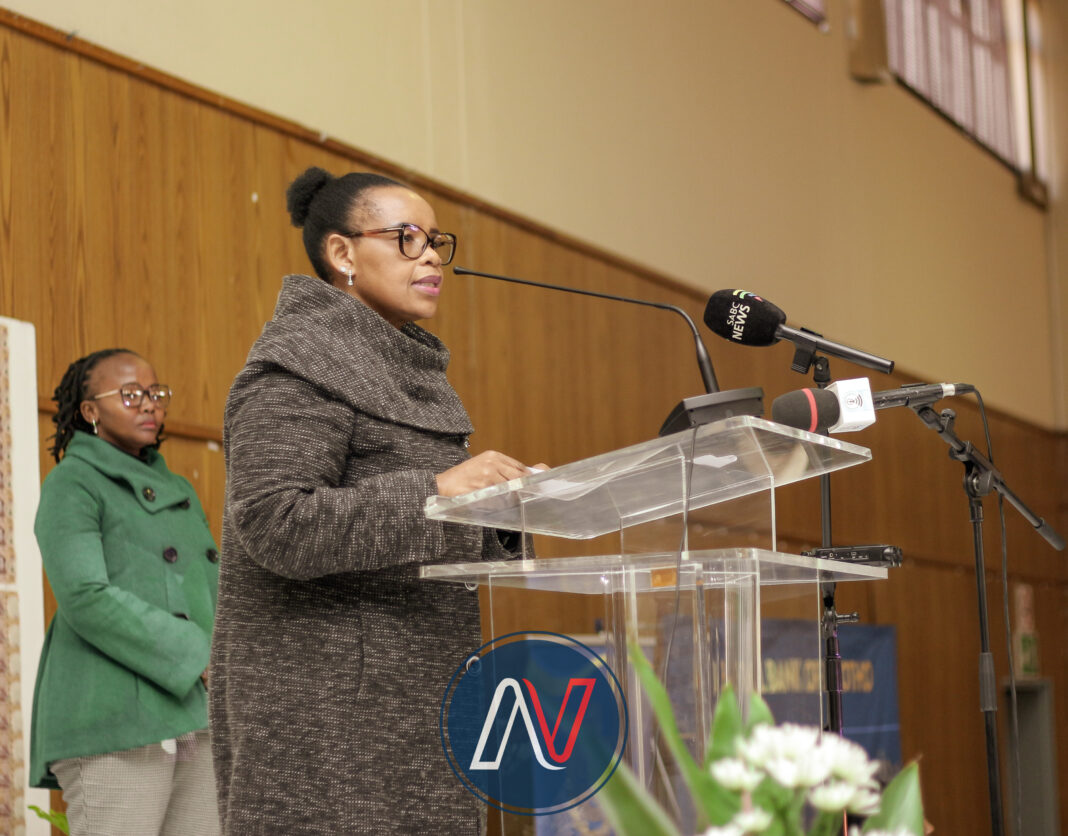… ‘intentionally’ delays reforms process
Mohloai Mpesi
Deputy Prime Minister, Nthomeng Majara, has expressed the government’s frustration over the ‘intentional’ derail of the reforms process by members of the opposition in the National Assembly.
Majara, who also serves as the Minister of Justice, Law, and Parliamentary Affairs, expressed the government’s thwarting over the lack of consensus on the 11th Amendment to the Constitution, commonly referred to as the Omnibus Bill.
DPM Majara emphasised that the opposition’s behavior has been hindering progress.
The Omnibus Bill failed to pass into law last year when the 10th Parliament was dissolved.
In response, a state of emergency was declared by then-Prime Minister Moeketsi Majoro, leading to the recall of parliament to address the bill’s passage.
However, these actions were later challenged and successfully overturned in the Constitutional Court by media practitioner Kananelo Boloetse and advocate Lintle Tuke.
Subsequently, the government has been diligently working to revive the bill since the beginning of this year.
Majara revealed that multiple scheduled meetings aimed at achieving consensus between opposition leaders, the senate, and the government have been dishonoured by the opposition.
While addressing the issue, Majara highlighted a key point of contention: the division of the Omnibus Bill into three distinct parts.
“The problem is that leaders of opposition do not want the bill to be divided into three parts as we want,†she said.
The government’s proposed divisions include amendments requiring a simple majority, those needing a two-thirds majority, and those necessitating a referendum majority.
Majara outlined the efforts made by the government to engage various stakeholders in consultations, including political parties both within and outside of parliament, the Christian Council Lesotho (CCL), security institutions, the business sector, media, youths, legal professionals, women, and people living with disabilities.
She explained that although opposition leaders initially resisted the division of the bill, a consensus was eventually reached on the need for division during discussions held on May 19, 2023.
However, she lamented that subsequent meetings were repeatedly dishonoured by the opposition.
Furthermore, she cited the excuse of preparing for Local Government elections as a recurring reason for opposition leaders failing to attend meetings.
“On the day that we were supposed to meet with Senate, I received a message from the opposition saying they were no longer coming to the meeting. They are lately giving similar excuses that they are preparing for the Local Government elections, so they are busy,†she said.
“Until now I am unable to bring them to the discussion table,†she added.
Despite these challenges, Majara affirmed the government’s unwavering commitment to advancing the national reform process.
Deputy Prime Minister Majara emphasised that the government remains dedicated to inclusivity and the success of the reform agenda.
She underscored the intention to work collaboratively with all stakeholders and expressed hope that meaningful progress could be achieved through constructive dialogue.
She further explained that last week the government received a Southern African Development Community (SADC) oversight committee led by former President of Tanzania Jakaya Mrisho Kikwete and former Deputy President of Mauritius to monitor the process of the reforms.
“We gave them a report about how the journey is going and the challenges we are faced with. Apparently, the opposition told the committee that the government is dragging its feet. I explained to the committee we have been inviting the opposition to meetings.
“The committee said I should invite the opposition again; we arranged another meeting for last week Wednesday. In the morning when I was preparing to attend the meeting I received a message alerting me that the opposition leaders will not attend,†she said.
“The reason was the same; they are busy with local government elections,†she added.
When contacted this week, opposition leaders presented a different perspective. Professor Nqosa Mahao, leader of the Basotho Action Party (BAP), stated that the government’s scheduling conflicts contributed to the opposition’s inability to attend meetings.
Mahao revealed that the opposition had urged the government to address reforms since January, in anticipation of the Southern African Development Community (SADC) summit this month.
Machesetsa Mofomobe, leader of the Basotho National Party (BNP), accused the government of lacking genuine commitment to the reforms.
Mofomobe highlighted prior attempts by the opposition to revive the Omnibus Bill, which were allegedly denied by Majara and the Speaker of the National Assembly, Tlohang Sekhamane.
“So now they are under pressure because they have to report to SADC and as a result they exert pressure on us, no we are not their children. That woman (Majara) would send us invitations at night inviting us to a meeting on the following morning. they want to treat us like children,†he said.


